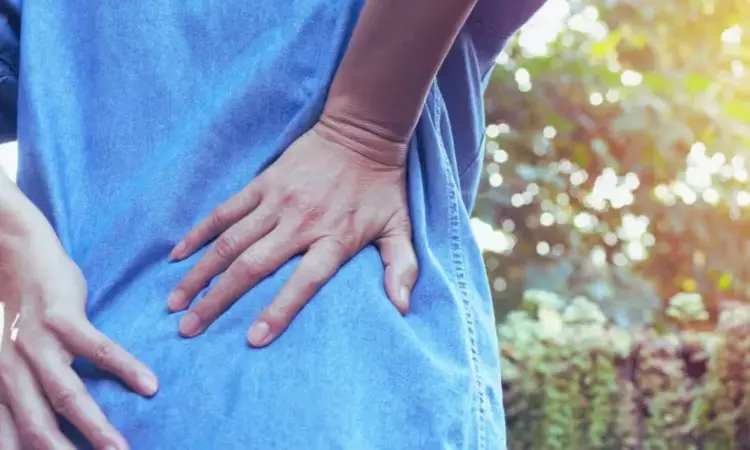- Home
- Medical news & Guidelines
- Anesthesiology
- Cardiology and CTVS
- Critical Care
- Dentistry
- Dermatology
- Diabetes and Endocrinology
- ENT
- Gastroenterology
- Medicine
- Nephrology
- Neurology
- Obstretics-Gynaecology
- Oncology
- Ophthalmology
- Orthopaedics
- Pediatrics-Neonatology
- Psychiatry
- Pulmonology
- Radiology
- Surgery
- Urology
- Laboratory Medicine
- Diet
- Nursing
- Paramedical
- Physiotherapy
- Health news
- Fact Check
- Bone Health Fact Check
- Brain Health Fact Check
- Cancer Related Fact Check
- Child Care Fact Check
- Dental and oral health fact check
- Diabetes and metabolic health fact check
- Diet and Nutrition Fact Check
- Eye and ENT Care Fact Check
- Fitness fact check
- Gut health fact check
- Heart health fact check
- Kidney health fact check
- Medical education fact check
- Men's health fact check
- Respiratory fact check
- Skin and hair care fact check
- Vaccine and Immunization fact check
- Women's health fact check
- AYUSH
- State News
- Andaman and Nicobar Islands
- Andhra Pradesh
- Arunachal Pradesh
- Assam
- Bihar
- Chandigarh
- Chattisgarh
- Dadra and Nagar Haveli
- Daman and Diu
- Delhi
- Goa
- Gujarat
- Haryana
- Himachal Pradesh
- Jammu & Kashmir
- Jharkhand
- Karnataka
- Kerala
- Ladakh
- Lakshadweep
- Madhya Pradesh
- Maharashtra
- Manipur
- Meghalaya
- Mizoram
- Nagaland
- Odisha
- Puducherry
- Punjab
- Rajasthan
- Sikkim
- Tamil Nadu
- Telangana
- Tripura
- Uttar Pradesh
- Uttrakhand
- West Bengal
- Medical Education
- Industry
Longer Antibiotic Therapy and Early PCN Drainage Linked to Better Outcomes in Urosepsis with Upper Ureteral Stones: Study

Taiwan: A retrospective study published in BMC Urology has highlighted critical factors for improving outcomes in patients with urosepsis complicated by upper ureteral stones. The research, led by Pai‑Yu Cheng and colleagues from the Division of Urology, Far Eastern Memorial Hospital, New Taipei City, Taiwan, explored the ideal duration of antibiotic therapy, the timing of percutaneous nephrostomy (PCN) drainage, and the scheduling of ureteroscopic lithotripsy (URSL) in this high-risk group.
Urosepsis resulting from obstructive acute pyelonephritis (APN) linked to ureteral stones poses significant management challenges, with no universally accepted protocols for antibiotics, drainage, or surgical intervention timing. To address this gap, the team analyzed data from 107 patients treated between 2013 and 2019 who underwent PCN followed by URSL. Patient demographics, comorbidities, laboratory findings, microbiological profiles, and stone characteristics were reviewed to identify key predictors of post-URSL complications.
The following were the study’s key findings:
- 32% of patients developed fever following ureteroscopic lithotripsy (URSL).
- Afebrile patients had received antibiotics for a longer duration before surgery (7.1 vs. 5.7 days).
- Those without fever experienced shorter postoperative hospital stays (3.1 vs. 5.3 days).
- The duration of antibiotic therapy and the interval between percutaneous nephrostomy (PCN) placement and URSL were significant predictors of post-surgical fever risk.
- Administering antibiotics for more than seven days before URSL was linked to a lower incidence of postoperative fever.
- Diabetes mellitus was identified as an independent risk factor for post-URSL fever in patients receiving prolonged antibiotic therapy, increasing the risk ninefold (odds ratio = 9.07).
- Emergent PCN drainage facilitated earlier URSL and contributed to shorter hospital stays.
- Escherichia coli was the most commonly isolated pathogen, consistent with patterns in urinary tract infections.
The findings emphasize the need for careful preoperative planning, particularly in diabetic patients, and highlight the benefit of timely PCN combined with an adequate duration of antibiotics to minimize complications and optimize recovery.
While the results provide valuable real-world evidence for managing urosepsis due to upper ureteral stones, the authors noted several limitations. The retrospective, single-center nature of the study may have introduced selection bias, and factors such as stone composition, operative time, and intraoperative complications were not fully assessed. Additionally, the influence of bacterial strain variations on postoperative systemic inflammatory response syndrome (SIRS) was not evaluated. Advances such as intrarenal pressure monitoring and irrigation pressure control were also not incorporated into the study design.
The authors emphasized the need for larger, prospective, randomized trials to validate these findings and establish standardized protocols. Nonetheless, the study offers important insights, suggesting that emergent PCN and antibiotic courses longer than seven days can significantly improve outcomes in patients with urosepsis complicated by upper ureteral stones, while also identifying diabetes mellitus as a key risk factor for postoperative fever.
Reference:
Hsu, JT., Lin, CM., Hung, SF. et al. Optimizing antibiotic duration and percutaneous nephrostomy timing in urosepsis complicated by upper ureteral stones: a retrospective study. BMC Urol 25, 182 (2025). https://doi.org/10.1186/s12894-025-01868-7
Dr Kamal Kant Kohli-MBBS, DTCD- a chest specialist with more than 30 years of practice and a flair for writing clinical articles, Dr Kamal Kant Kohli joined Medical Dialogues as a Chief Editor of Medical News. Besides writing articles, as an editor, he proofreads and verifies all the medical content published on Medical Dialogues including those coming from journals, studies,medical conferences,guidelines etc. Email: drkohli@medicaldialogues.in. Contact no. 011-43720751


